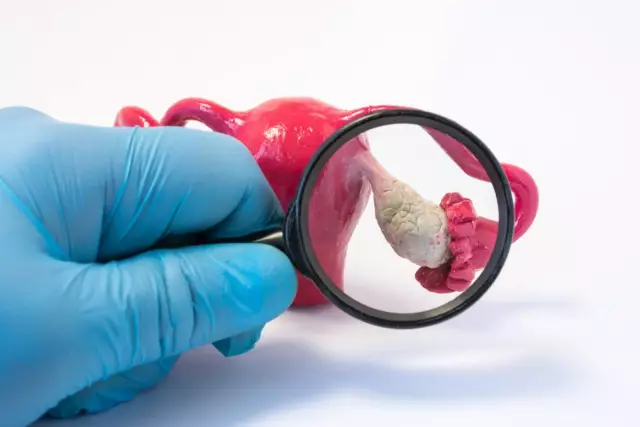- Author Rachel Wainwright wainwright@abchealthonline.com.
- Public 2023-12-15 07:39.
- Last modified 2025-11-02 20:14.
Multifollicular ovaries

One of the most important female reproductive organs is the ovaries. In them, during each menstrual cycle, several follicles (from 4 to 7), containing eggs, mature. But with the growth and development of 1 - 2 follicles begin to significantly overtake the rest and inhibit their development. These large follicles are called dominant follicles. When the egg is fully ripe, the dominant follicle bursts and the egg enters the abdominal cavity, and from there into the fallopian tube. In place of the bursting follicle, a temporary endocrine gland is formed - the corpus luteum. If more than 8 follicles mature in the ovaries, then this condition is called multifollicular ovaries. This condition can be both a variant of the norm and a sign of a disease - polycystic ovary disease.
Multifollicular ovaries: causes
Excessive monthly maturation of follicles is most often due to genetic factors. Another cause of multifollicular ovaries may be insufficient secretion of the anterior pituitary gland of luteinizing hormone. Very often, this violation of its secretion is caused by significant and sharp fluctuations in body weight.
Multifollicular ovaries can be observed in women in the first two to three menstrual cycles after stopping oral contraceptive use, as well as in adolescent girls until the end of their puberty.
As you can see, the causes of multifollicular ovaries can be very different. Therefore, if more than 8 maturing follicles were found during an ultrasound examination, then you should not panic. This is just an excuse to undergo a more in-depth medical examination, including donating blood for hormones.
Signs of multifollicular ovaries
In most cases, multifollicular ovaries are detected completely by accident during ultrasound examination. In cases where the reason for the maturation of a large number of follicles is a low level of luteinizing hormone, a possible symptom of multifollicular ovaries is menstrual irregularities.
In severe cases, menstruation may be absent for six months or more (amenorrhea). This is due to the fact that none of the follicles reaches the dominant size, and ovulation does not occur. Therefore, many women, having heard about their peculiarities, ask doctors: "Is it possible to get pregnant with multifollicular ovaries?" I would like to reassure them. Yes, you can, because most often in women with multifollicular ovaries, ovulation still occurs, which means that pregnancy may well occur.
Multifollicular Ovaries and Pregnancy

As we have already said, pregnancy is quite possible in women with multifollicular ovaries. Obstetricians-gynecologists are not surprised at such a combination of multifollicular ovaries and pregnancy, but at the same time they consider it as one of the factors contributing to the onset of spontaneous miscarriage or premature birth.
Thus, it can be argued that the combination of multifollicular ovaries and pregnancy requires a more attentive attitude towards the woman by her doctor and, if necessary, additional research.
Multifollicular ovaries: treatment
If a woman with multifollicular ovaries does not have any hormonal imbalance, and her own ovulation regularly occurs, then they are not prescribed any drug therapy. In this case, the existing syndrome is regarded as one of the variants of the norm.
Treatment of multifollicular ovaries is necessary only if a woman does not observe ovulation confirmed by folliculometry for 4 to 5 menstrual cycles in a row. In this case, the woman is examined jointly by a gynecologist and an endocrinologist. After the exact cause of the multifollicular ovaries is established, the woman is prescribed appropriate treatment. All doctor's recommendations and prescriptions should be taken as seriously as possible. Never take hormones on the advice of your friends or try to treat multifollicular ovaries with folk methods!
YouTube video related to the article:
The information is generalized and provided for informational purposes only. At the first sign of illness, see your doctor. Self-medication is hazardous to health!






